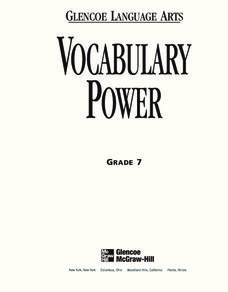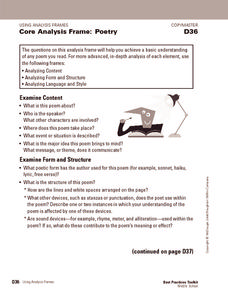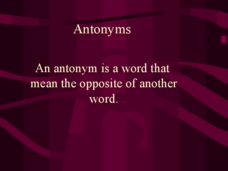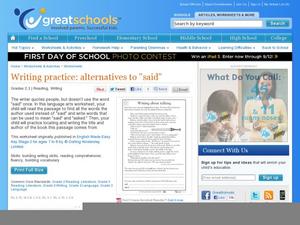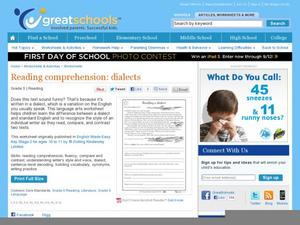McGraw Hill
Vocabulary Power
Augment your language arts units with a set of vocabulary worksheets. The packet is an excellent support to your vocabulary instruction that covers a variety of skills, including context clues, Greek and Latin roots, reference materials,...
Novelinks
The Little Prince: Brainstorming Activity
What do you think of when you hear the word adult? Or friend? Learners brainstorm with a group of peers to list the words they think of when they hear seven words from Antoine de Saint-Exupéry's The Little Prince.
Macmillan Education
Understanding Poetry (Elementary)
Introduce young readers to poetry analysis with a learning exercise that uses Emily Bronte's "Spellbound" to model how poets use word choice, the sounds of words, the repetition of words, and rhyming patterns to create the mood, tone,...
Practice Using Lively Language
Practice Using Lively Language
Combine a study of biography writing with some tips for spicing up writing. After reading two passages, one much more descriptive than the other, pupils examine what makes one more interesting. They then brainstorm some ideas for writing...
ESL Writing
Paraphrase with Synonyms
What's another word for paraphrasing? Ask your pupils to put their minds to work in order to replace underlined words in a series of sentences with appropriate synonyms.
Curated OER
The Sound of…Poetry!
Scritch, scratch, scritch. It's the sound of pupils writing poetry! Focus on sensory language and onomatopoeia with a writing lesson. After listening to some sounds, learners examine a couple of poems that include sound words and then...
Smekens Education Solutions, Inc.
Introducing the 6 Traits to Students
Put together an English language arts unit on the six traits of writing with this helpful collection of resources. From fun songs to differentiated writing exercises reinforcing each of the traits, great ideas are provided for developing...
Houghton Mifflin Harcourt
Core Analysis Frame: Poetry
Dig deep into any piece of poetry with a set of analysis questions. Ponder the content, form, and language of poetry and provide some question for critique. The first two pages include general questions, and the remainder of the document...
Write At Home
250 Ways to Say "Went"
Getting tired of seeing went over and over again in student writing? Banish boring verbs with a list of 250 different substitutes for that mundane word went. Organized in alphabetical order, words such as bustled, inched, and tottered...
EngageNY
Summarizing Complex Ideas: Comparing the Original UDHR and the "Plain Language" Version
The eighth lesson plan in this series continues the focus on vocabulary and increasing young readers' awareness of academic language. Pairs of learners participate in a short vocabulary review activity called Interactive Words in which...
Curated OER
Prefixes Micro- and Mega-
Explore vocabulary context clues with a prefix activity. Using the prefixes micro- and mega-, fourth graders complete sentence frames. They then make up their own word with the correct prefixes. Helpful as homework or during a writing...
Curated OER
Antonyms: Opposite Words
Learning about antonyms can help learners build a diverse vocabulary and better understand word meaning and choice. They work through eight different sentences by determining which words are antonyms. This nicely designed presentation...
Curated OER
Creative Writing Workshop (Middle, Reading/Writing)
Bring this lesson into your unit about creative writing and precise language. First, middle schoolers create a piece of writing with the help of their classmates. In the second part of this workshop, they edit their own piece of writing....
Curated OER
Writing About Talking
The story of King Arthur is a fascinating one, and this retold excerpt offers an excellent example of narrative word choice in a dialogue. Learners read the text and examine the way the author uses synonyms for said. They write down all...
Curated OER
Dead Word Wall Kills Overused Words
Have your class attend a funeral for the words they overuse in their writing. They develop a list of alternate words for those overused words, and make an effort to employ alternatives whenever possible. This is a great way to improve...
Curated OER
Does Mother Nature Know Best?
Investigate herbal medicine in the science or health classroom with this lesson from the New York Times. After a discussion about class members beliefs about and experiences with herbal medicines, pupils read an article that might impact...
Curated OER
Jeffrey and Sloth: Six Traits of Writing
Use drawings as inspiration. Have learners doodle for 10 minutes before beginning the lesson. Then, have them use their doodles to inspire a story. Several writing activities are included here to play with writing. One of my favorites...
Curated OER
Connotation and Denotation: How Word Choice Affects a Paragraph
Review the terms denotation, connotation, diction, and mood in paragraph writing. After defining the terms, middle schoolers practice writing examples of both connotation and denotation. They complete a connotation and denotation graphic...
Curated OER
Vivid Verbs
Spice up your writing! Your amateur writers will benefit from concentrating on understanding and improving verb use in writing. An introductory activity addresses weak verbs. A second exercise helps them see the importance of strong...
Curated OER
Changing Seasons
Explore expository writing and using precise language in this descriptive paragraph writing lesson. Learners brainstorm prior knowledge about the changing seasons in Ohio. They describe seasonal items, view seasonal pictures from...
Curated OER
Further Improvements of Writing Skills
Improve writing skills by finding a personal writing style, using descriptive language effectively, and using precise language. Middle schoolers discuss individual style in writing and formal and informal language. They utilize figures...
Curated OER
Setting the Tone with Figurative Language
Explore figurative language with your secondary class. Extending a language arts unit, the lesson prompts middle schoolers to examine how an author's word choice establishes a story's tone, possibly using metaphors, similes,...
Curated OER
Sentence Completion 10
Can your English language learners pick up on the subtle hints imbedded in each sentence? There are eight sentences provided, and your learner must read each and identify the best possible answer from five multiple-choice options...
Curated OER
Reading a Dialect
Reading a dialect can be difficult; show readers that it can also reveal fascinating details! They read two extracts from Jane Gardam's The Hollow Land, which is written in a British dialect. Readers answer comprehension questions,...


